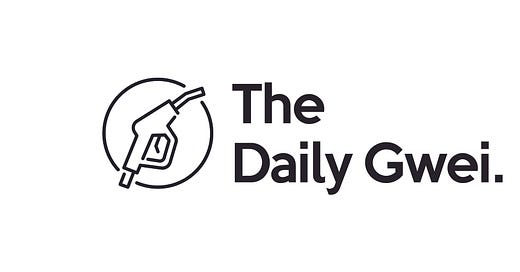Inefficient Markets - The Daily Gwei #244
Oh, you thought that the markets priced everything in?
I’ve never believed that the “efficient market hypothesis” was anything more than wishful thinking because, as we’ve all seen (especially lately), markets are not efficient at all - especially not the crypto markets. Though, of course, this inefficiency can only last for so long until enough people wake up to something being “undervalued” and the market starts to “price in” certain things.

As you can see in James’ tweet above, SushiSwap as a “company” is profitable and actually returns these profits to SUSHI token holders (via staking) whereas Amazon hasn’t returned any profits to share holders in its entire history. Now, of course, Amazon has much more revenue than SushiSwap and is known for aggressively reinvesting its profits to grow its business so the comparison isn’t totally fair. Though to get back on topic - I think that many DeFi protocols are not being priced efficiently by the market even though they are already profitable and have growing revenues.
There are many DeFi protocols on Ethereum that generate revenue and pay this out in some way to token holders (whether it be via staking, a buy and burn or some other mechanism). Maker is famous for its buy and burn model and currently generates $140 million worth of annualized protocol revenue but I’m sure many of you are aware of how poorly the MKR token has performed on the open markets (up until recently, at least). This to me is a very clear example of the market being totally inefficient for a very long time and not pricing in Maker’s fundamentals (even though these fundamentals are all publicly known)!
This inefficiency doesn’t just apply to DeFi - the best example of market inefficiency in my view would be ETH itself. Think about it - upgrades that are just now beginning to be “priced in” have been known about for years! EIP-1559 was first published in April of 2019 and the eth1 <> eth2 merger was being spoken about in late 2018 (and eth2’s economic model was known back then too). And yet ETH sat between $100 and $300 in the latter half of 2018, most of 2019 and early 2020. If you had the foresight and conviction to invest in ETH during this time based on this pure public alpha (and held until now) you’ve done very well and deserve the win!
Alpha is literally everywhere in the crypto ecosystem and it isn’t even very hard to find (and no, I’m not talking about gambling on “dog coins”). Some ways to find legitimate alpha is to simply follow projects more closely - talk to the developers, monitor the Github repos, read the governance forum, join the Discord/Telegram channels and more. Though in saying that investing in general is still very risky and there’s a million other variables to take into account and strategize your investments based on (and of course nothing I ever say is investment advice - I’m just a humble alpha farmer). Go forth and find the alpha friends - it’s out there!
Have a great day everyone,
Anthony Sassano
Join the Daily Gwei Ecosystem
All information presented above is for educational purposes only and should not be taken as investment advice.




